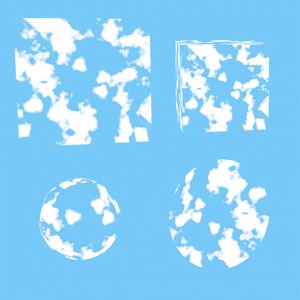VolumeCloud: Difference between revisions
mNo edit summary |
No edit summary |
||
| Line 1: | Line 1: | ||
{{ | {{this is a|pixel shader|name=VolumeCloud}} It takes three input materials and creates a cloud effect. It can be applied to [[models]], and requires further testing for compatibility with proxies and parameters. | ||
[[File:volumecloud_example.jpg|thumb|Volume Cloud applied to various mesh]] | [[File:volumecloud_example.jpg|thumb|Volume Cloud applied to various mesh]] | ||
Revision as of 18:04, 5 January 2024
VolumeCloud is a Pixel shader available in all ![]() Source games. It takes three input materials and creates a cloud effect. It can be applied to models, and requires further testing for compatibility with proxies and parameters.
Source games. It takes three input materials and creates a cloud effect. It can be applied to models, and requires further testing for compatibility with proxies and parameters.
As the shader is intended to simulate moving cloud cover it does not receive shadows. The effect works best with mostly white, transparent noise but also works with non-transparent textures.
The various texture layers all rotate counter clockwise around the "center" of the UV map. Each layer has additive blending on the others, which allows the depth effect to look seamless with white clouds that layer upon each-other. All three base textures are required to be defined, each one in the sequence rotating at a lower speed.
Supported Parameters
- $basetexture
- the first texture.
- $basetexture2
- the second texture.
- $basetexture3
- the third texture.
- $refractamount
- Todo: What does it do
- $time
- Needs CurrentTime
- Todo: What does it do
See also
- Materials for models
- UnlitGeneric, A fullbright shader useful for skybox elements
- VertexLitGeneric, the standard shader for models
